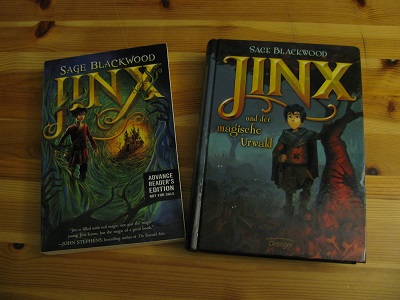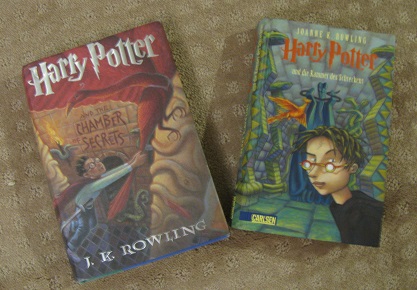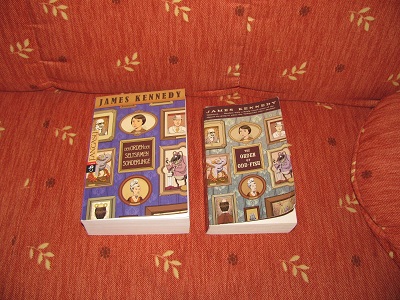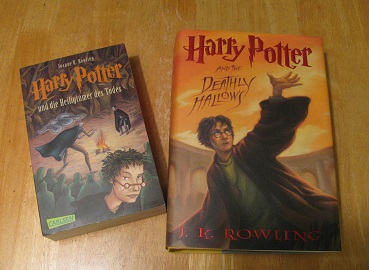Sonderling Sunday – The Duel Begins!
It’s time for Sonderling Sunday, that time of the week when I play with language by looking at the German translations of children’s books.
This week it’s back to the most Sonder book of them all, Der Orden der Seltsamen Sonderlinge, also known as The Order of Odd-Fish, by James Kennedy.
Last time, and the time before that, we were inside the Dome of Doom, getting ready for a momentous duel between Fumo, the Sleeping Bee, versus Zam-Zam, the Dancing Ant of Sadness. The duel was preceded by ritualized insults and threats, which were most entertaining in German, I must say.
Now, however, we’re ready for the actual duel! We left off on page 263 and Seite 334 with the words, “Oh , look, it’s starting!” (Oh, sieh nur, es geht los!)
I challenge my readers to think of a way to use this first sentence:
“Both duelists had mounted their ostriches.”
= Die beiden Duellanten waren auf ihre Strauße gestiegen.
“buckling on the ostriches’ armor”
= schnallten die Rüstungen der Strauße fester
“The crowd roared.” = Die Menge tobte.
“ignited their double-bladed lances” = ihre beidseitigen Lanzen entzündeten
“snapped at each other’s throats”
= sich gegenseitig nach der Kehle schnappten
“slumped” = zusammengesunken
“The ostriches stamped and growled”
= Die Strauße stampften und knurrten
“true aficionado” = echten Liebhaber
“bad form” = schlecter Stil
“The crowd went wild” = Die Menge flippte fast aus
“ferocious” = unerbittlich
“The crowd howled with delight.” = Die Zuschauer johlten vor Begeisterung.
“reclaim his dangling master”
= seinen herunterbaumelnden Herrn zurückzubekommen
“So humiliating” = Wie demütigend
A slightly different way of putting it:
“plunging into the water far below”
= landete mit einem Riesenplatscher im Wasser weit unter ihm
(“landed with a giant-splash in the water far below him”)
“gurgling with embarrassment” = gurgelte vor Verlegenheit
“hobbled” = humpelte
“I’d like to take her down a notch.”
= Ich würde sie liebend gern ein bisschen zurechtstutzen.
(“I would her love to a bit prune.”)
“square-jawed” = mit einem kantigen Kinn
(“with an edged chin”)
“Her bald skull was gouged with scars”
= Ihr kahler Schädel war von Narben übersät
“low rumble” = tiefen Grollen
Huh. That’s funny. At the bottom of page 337, “whispered Audrey” is translated flüsterte Orwell. Either that’s a mistake, or I forgot that Audrey’s last name is Orwell.
“The smell of sweat!” = Der Geruch von Schweiß!
“The smell of ostrich poop!” = Der Geruch von Straußenkot!
“gangly” = schlaksiger
“collapse” = zusammenbrechen
“screams, yelps, shouts of panic” = schrien, kreischten und brüllten voller Panik
“rock ceiling” = Felsendecke
“What a kid!” = Was für ein Prachtkerl!
“This kid doesn’t waste words.”
= Dieser Junge verschwendet wirklich keine Worte.
“moxie” = Mumm
“headlock” = Schwitzkasten
“muffled” = genuschelte
“ya big lug!” = du Knilch!
“bozos” = Saufköpfe
“One good turn deserves another, eh!”
= Eine Hand wäscht die andere, sagt man nicht so?
(“One hand washes the other, isn’t that so?”)
“pals” = Kumpel
Translating made-up words are always interesting:
“moffle-hoppers” = Schlappohren (“limp-ears”)
“buzzing voice box” = Verzerrer (“distortion”)
“Consider yourself challenged!”
= Betrachte dich als herausgefordert!
And we’ll finish it off with the last sentence of the chapter:
“I was kidding about the shoe.”
= Das mit Schuh war nur ein kleiner Scherz von mir.
I challenge you to use that in your conversation this week!
Till next time! Bis bald!









